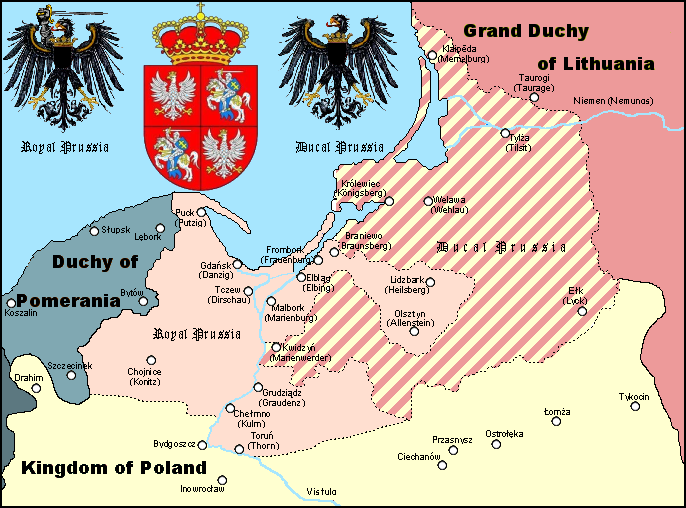Ius Indigenatus on:
[Wikipedia]
[Google]
[Amazon]
 ''Ius indigenatus'' (
''Ius indigenatus'' (
* Michael G. Müller, ''Zweite Reformation und Städtische Autonomie im Königlichen Preußen. Danzig, Elbing und Thorn in der Epoche der Konfessionalisierung (1557–1660)'', Berlin 1998, * Hans-Jürgen Bömelburg, ''Zwischen polnischer Ständegesellschaft und preußischem Obrigkeitsstaat. Vom Königlichen Preußen zu Westpreußen (1756–1806)'', München 1995, Latin legal terminology German nationality law Law of Prussia Royal Prussia Duchy of Prussia {{Poland-hist-stub
 ''Ius indigenatus'' (
''Ius indigenatus'' (Latin
Latin (, or , ) is a classical language belonging to the Italic branch of the Indo-European languages. Latin was originally a dialect spoken in the lower Tiber area (then known as Latium) around present-day Rome, but through the power of the ...
for "right of local birth") is a right
Rights are law, legal, social, or ethics, ethical principles of Liberty, freedom or entitlement; that is, rights are the fundamental normative rules about what is allowed of people or owed to people according to some legal system, social convent ...
which was from the 15th to the 18th century a requirement for people to hold royal office in Royal Prussia, a Polish province. It limited offices and land ownership to local Prussian natives.
It was confirmed in 1466 by the Second Peace of Thorn which secured a large decree of autonomy
In developmental psychology and moral, political, and bioethical philosophy, autonomy, from , ''autonomos'', from αὐτο- ''auto-'' "self" and νόμος ''nomos'', "law", hence when combined understood to mean "one who gives oneself one's ...
for Royal Prussia. The Prussian Ius indigenatus was valid for both parts of Prussia separated in 1466, the western part, later called Royal Prussia, and the eastern part, from 1525 the Duchy of Prussia
The Duchy of Prussia (german: Herzogtum Preußen, pl, Księstwo Pruskie, lt, Prūsijos kunigaikštystė) or Ducal Prussia (german: Herzogliches Preußen, link=no; pl, Prusy Książęce, link=no) was a duchy in the Prussia (region), region of P ...
, later East Prussia
East Prussia ; german: Ostpreißen, label=Low Prussian; pl, Prusy Wschodnie; lt, Rytų Prūsija was a province of the Kingdom of Prussia from 1773 to 1829 and again from 1878 (with the Kingdom itself being part of the German Empire from 187 ...
.
See also
*Jus soli
''Jus soli'' ( , , ; meaning "right of soil"), commonly referred to as birthright citizenship, is the right of anyone born in the territory of a state to nationality or citizenship.
''Jus soli'' was part of the English common law, in contras ...
*Jus sanguinis
( , , ; 'right of blood') is a principle of nationality law by which citizenship is determined or acquired by the nationality or ethnicity of one or both parents. Children at birth may be citizens of a particular state if either or both of t ...
*Indygenat
''Indygenat'' or 'naturalization' in the Polish–Lithuanian Commonwealth was the grant of nobility to foreign nobles. To grant ''indygenat'', a foreign noble had to submit proof of their service to the Republic, together with proof of nobility is ...
References
*Karin Friedrich
Karin Friedrich (born 12 June 1963, in Munich) is a German historian, a professor in history at the University of Aberdeen King's College.
Friedrich received an M.A. in history and political science from Ludwig Maximilian University of Munich i ...
, ''The Other Prussia. Royal Prussia, Poland and Liberty, 1569–1772'', Cambridge, 2000,* Michael G. Müller, ''Zweite Reformation und Städtische Autonomie im Königlichen Preußen. Danzig, Elbing und Thorn in der Epoche der Konfessionalisierung (1557–1660)'', Berlin 1998, * Hans-Jürgen Bömelburg, ''Zwischen polnischer Ständegesellschaft und preußischem Obrigkeitsstaat. Vom Königlichen Preußen zu Westpreußen (1756–1806)'', München 1995, Latin legal terminology German nationality law Law of Prussia Royal Prussia Duchy of Prussia {{Poland-hist-stub